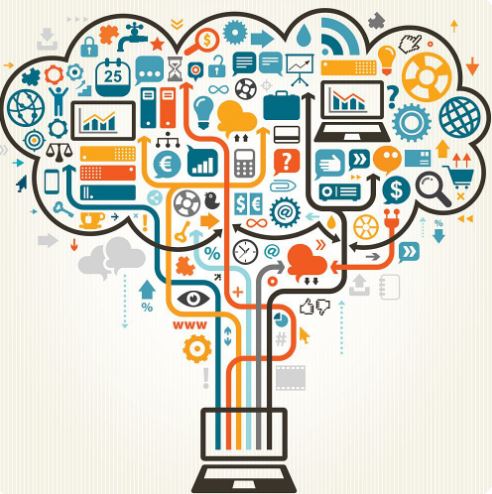History of nations has always shown a deep correlation of technology and economic development, with nations investing in technical infrastructure outperforming in the key macro-economic indicators and holding a competitive edge over the rest. The three major industrial revolutions the world has so far witnessed, have always leveraged upon technology, followed by exponential economic growth, job opportunities, and improvement in living standards of the masses.
The global digital economy contributes 15.5% to the global GDP, which amounts to a whopping $11.5 trillion. This global trend implies that technology is swiftly penetrating and encompassing all the sectors of health, industry, education, agriculture, and services. This trend also emphasizes that to keep pace with the global trend of growing technology sector, national contribution of technology to GDP should be at least 6%. And to avail a competitive edge over other economies in aggressively pursuing a global market share, the share of GDP must be around 7-10% as in the case of India (9%), Singapore (20%) and similar trend is replicated in the fast growing economies, advocating special attention and support to the tech-sector, and asserting the contribution of technology to the overall national economy.
For developing countries like Pakistan, the technology must be viewed as the only tool and driving force to steer the economic growth, ensure financial inclusion, and lift people out of poverty. Technology must be placed in the pivotal place to address the challenges of a stumbling economy with meager local production, high imports, and dwindling FDIs. A comprehensive national knowledge based economic strategy must be devised and implemented to cater for the needs of a tech-driven economy. Such strategy should also provide a comprehensive framework to address the governance, security and other policy-related issues. Government must be ready to allocate substantial amounts in budget for capital investments in technology infrastructure to expedite the shift to sophisticated technologies. The key focus areas on which Pakistan can leverage upon, to drive its economy through technology are:
1. Access to Technology: A tool of Economic Inclusion:
Pakistan is home to the youngest population in the world, comprising of 60% of population, the potential of which has to be unleashed and tapped for contribution in the national economic growth. Therefore, the first and foremost priority for providing global market access to the masses, especially to the youth, is through access to technology. Access to technology is the only tool which can inculcate enterprising abilities in the population and provide gateway for knowledge access.
Services sector of Pakistan is the major contributor to national GDP, and this sector relies heavily on ICT infrastructure and outreach. One of the many examples of lucrative and revenue-generation services is tourism and hospitality. The technology accessibility in remote areas of Pakistan has enabled the locals to provide hospitality services to almost every global citizen. Same is the case for e-commerce, logistics, and supply chain. These sub-sectors are the building blocks of any economic activity, and only through technology penetration and accessibility, inclusion of the masses can be ensured.
2. Financial Access and Inclusivity:
Pakistani businesses have faced tremendous losses due to mistrust of the international creditors. Many emerging local enterprises have failed to gain global market share due to lack of gateways for secure payments and hurdles in international transactions. With the adoption of technologies like block-chain and e-currency, facilitation of secure payments will boost the business activities and enhance trust of international buyers in local suppliers.
3. Industry 4.0:
With the fourth industrial revolution, Industry 4.0, dawning the horizons of global economy, only the economies investing in infrastructures and capacity building to facilitate such a massive mutiny will survive in the global markets. IoT, Blockchain, and AI are completely replacing the conventional operations of businesses like manufacturing, supply chain, quality assurance, marketing etc. In order to compete in the global markets, local companies need to quickly respond and adopt such agile technologies, and Pakistan is not exempted from such response. Early adoption of such technologies will definitely attain us an edge over other South Asian markets like India and Bangladesh.
4. Knowledge Economy:
The new paradigm of knowledge economy banishes the insular modes of operation for economy, but promotes a more socially inclusive and collaborative modes of production. Technology and perpetual innovation lies in the center of such a model, therefore, the reformative model of knowledge based economy cannot be adopted without technology.
5. Human Capital Development:
The economy of any market cannot flourish without the appropriate pool of human capital to carry out the economic activities. The new revolutionary economic models need skills sets and expertise which defy the existing modes of education and training. The gap between educational training and market needs have widened and technology is the tool to be leveraged upon to address this gap and produce human capital ready to be deployed in the market. Educational outreach and access to online vocational trainings and courses can be ensured only through appropriate technology access.
6. Policies and Frameworks:
Policy and governance play a pivotal role in either boosting or stalling economy of a nation. In order to formulate policies conducive to promoting economic activities, data and evidences are crucial tools. Big Data and AI are the ways to sense the local market needs, identify gaps, and formulate evidence based policies. Unfortunately, Pakistan lacks important data on major industrial sectors, and the policies have always favored certain sectors like agriculture, textiles, and manufacturing while neglecting others. It is time to analyze and revise the policies, which must be revised after careful data analyses. Pakistan has finally launched the “Digital Pakistan” initiative which is a laudable step towards digitalization and data collection for analyses and policies.
The author is Deputy Director at Office of Sustainability at National University of Sciences & Technology (NUST). She can be reached at ddsustainability@nust.edu.pk.

NUST Research, IOT, Technology, Digital Pakistan, International Transactions, Research Activities in Pakistan




